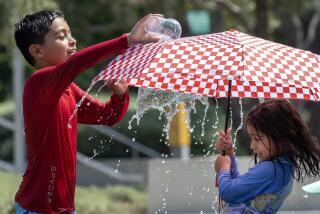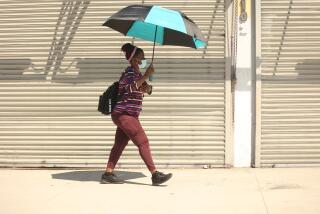When You’re Hot, You’re Hot . . .
Temperatures that hover around the triple digits can do weird things to a person’s mind.
In a Chatsworth park, the hot weather brings out a character who has appeared au naturel every so often over the last couple of years, said Sgt. David Clinton of the LAPD’s Devonshire Division.
“He ties himself up and lies by an area where joggers are and attracts their attention, telling them somebody kidnaped him and asks them to call the cops. By the time we arrive, he’s always gone,” Clinton said.
Hot weather behavior often isn’t that harmless. As temperatures rise, more tempers will flare, more marital spats will end in physical abuse, more cars will be stolen and more people will, in general, become downright cranky.
“Since people are more irritable and tempers are shorter, there is more verbal abuse,” said Clinton, who noted that the number of domestic violence calls to police rises along with the temperature.
“On a normal morning I may get five or six calls,” said Gail Pincus, a licensed clinical social worker and spousal abuse counselor at the Valley Trauma Center in Northridge. “But after a peak time such as a July 4th or Memorial Day weekend, the calls will double. The telephone lines are going to be jammed.”
And hospital emergency rooms such as the one at Valley Presbyterian in Van Nuys may see a 5% to 10% increase in traffic during the summer.
“Arguments, bodily injuries, assaults, accidents . . . people become much more irritable and prone to getting into fights in the summertime,” said Dr. Dennis Kelly, 42, chief of emergency services at Valley Presbyterian, whose staff has seen an increase in drug abuse-related injuries and domestic violence, including child abuse, in the last few years.
‘Heat as the Fuse’
“Look at the heat as the fuse that sets off something that is already there,” said Dr. William Matchett, chief of the Department of Psychiatry, Kaiser Hospital Woodland Hills. People with problems compounded by the heat start trickling into the emergency room after sunset, many times after they’ve been sitting home drinking beer, according to Matchett.
Pincus also cited increased alcohol consumption, especially beer, in hot weather as a contributing factor to marital violence. “They really think it’s just something to cool them off and the alcohol content is not something to worry about,” she said.
People also become confused on the causes of their irritability, Matchett said.
“You see a lot of family and marital quarrels, freeway altercations, monkey business, mistakes and rage from people not realizing their feelings are elevated by the heat. The end result at its worst is someone saying, ‘I’m going to kill myself’ or ‘I wish I were dead.’ ”
The heat brings on a desire to be left alone, said Matchett, who compared the situation to how a lion handles the heat: He lies down and cools off when he gets irritable, telling the world, in effect, to leave him alone.
“But we are trapped by culture, society and obligation,” he said. “We can’t do that much of the time, so our response to it is to be irritable with other people and feeling tense and pressure to get out.
“People come in and say, ‘I don’t know what’s happening,’ and they don’t. They think it’s interpersonal and it’s not. It’s the heat,” Matchett said.
The LAPD’s Clinton also believes that people tend to drink more in the summer, as well as more in public--in parks or their cars--which results in an increase in assaults, he said.
‘Little More Irritable’
“When it’s hot, we advise our officers to realize people may be a little more irritable. So if we’re upset or hostile, that just tends to escalate things,” Clinton said.
One behavior indirectly related to the heat is auto theft, which rises with the temperature because many drivers don’t roll their car windows up or leave the motor running to power the air conditioner while they quickly run into a store to shop, Clinton said.
Los Angeles Fire Department paramedics find themselves on the receiving end of increased verbal heat when it gets hot.
“We’re dealing with people who are emotionally upset anyway and the heat can increase that anxiety level,” said paramedic spokesman Kevin Nida. “When it’s above 100 degrees outside, people can be less rational.”
West Valley District Commander Harry Rich said most of the hostility is not directed at paramedics, but it’s “over stupid things” made worse by the heat. “There’s more traffic, people are out in the evenings, and the heat affects just about everyone.”
‘Pretty Thick Skin’
Valley Presbyterian’s Kelly said some patients have a much shorter fuse than others when it’s hot, resulting in more arguments with his staff, especially when the emergency room is busy and there is a long wait.
“We have to develop pretty thick skin,” he said. “At times, it’s hard not to let it bother us, so when it does, we encourage the staff to go off and collect their composure.”
To prevent mental overheating, just try to stay cool and comfortable, said Kaiser’s Matchett. “If you can’t protect yourself, that irritability comes out . . . in anybody.”
More to Read
Sign up for Essential California
The most important California stories and recommendations in your inbox every morning.
You may occasionally receive promotional content from the Los Angeles Times.










